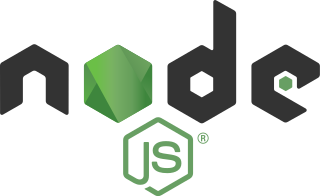JavaScript, often abbreviated as JS, is a programming language that conforms to the ECMAScript specification. JavaScript is high-level, often just-in-time compiled, and multi-paradigm. It has curly-bracket syntax, dynamic typing, prototype-based object-orientation, and first-class functions.
TypeScript is a programming language developed and maintained by Microsoft. It is a strict syntactical superset of JavaScript and adds optional static typing to the language. TypeScript is designed for the development of large applications and transcompiles to JavaScript. As TypeScript is a superset of JavaScript, existing JavaScript programs are also valid TypeScript programs.
This is a comparison of web frameworks that are heavily reliant on JavaScript code for their behavior.

Rack is a modular interface between web servers and web applications developed in the Ruby programming language. With Rack, application programming interfaces (APIs) for web frameworks and middleware are wrapped into a single method call handling HTTP requests and responses.

Node.js is an open-source, cross-platform, back-end JavaScript runtime environment that runs on the V8 engine and executes JavaScript code outside a web browser. Node.js lets developers use JavaScript to write command line tools and for server-side scripting—running scripts server-side to produce dynamic web page content before the page is sent to the user's web browser. Consequently, Node.js represents a "JavaScript everywhere" paradigm, unifying web-application development around a single programming language, rather than different languages for server-side and client-side scripts.
CommonJS is a project with the goal to establish conventions on the module ecosystem for JavaScript outside of the web browser. The primary reason for its creation was a major lack of commonly accepted forms of JavaScript module units which could be reusable in environments different from that provided by conventional web browsers running JavaScript scripts.

Opa is an open-source programming language for developing scalable web applications.
Mustache is a web template system with implementations available for ActionScript, C++, Clojure, CoffeeScript, ColdFusion, Common Lisp, Crystal, D, Dart, Delphi, Elixir, Erlang, Fantom, Go, Haskell, Io, Java, JavaScript, Julia, Lua, .NET, Objective-C, OCaml, Perl, PHP, Pharo, Python, R, Racket, Raku, Ruby, Rust, Scala, Smalltalk, Swift, Tcl, CFEngine and XQuery.
AngularJS is a JavaScript-based open-source front-end web framework for developing single-page applications. It is maintained mainly by Google and a community of individuals and corporations. It aims to simplify both the development and the testing of such applications by providing a framework for client-side model–view–controller (MVC) and model–view–viewmodel (MVVM) architectures, along with components commonly used in web applications and progressive web applications.
Emscripten is an LLVM/Clang-based compiler that compiles C and C++ source code to WebAssembly, primarily for execution in web browsers.

Socket.IO is a JavaScript library for realtime web applications. It enables realtime, bi-directional communication between web clients and servers. It has two parts: a client-side library that runs in the browser, and a server-side library for Node.js. Both components have a nearly identical API. Like Node.js, it is event-driven.
Yeoman is an open source client-side scaffolding tool for web applications. Yeoman runs as a command-line interface written for Node.js and combines several functions into one place, such as generating a starter template, managing dependencies, running unit tests, providing a local development server, and optimizing production code for deployment.

Ember.js is an open-source JavaScript web framework, utilizing a component-service pattern. It allows developers to create scalable single-page web applications by incorporating common idioms, best practices, and patterns from other single-page-app ecosystem patterns into the framework.
Meteor, or MeteorJS, is a free and open-source isomorphic JavaScript web framework written using Node.js. Meteor allows for rapid prototyping and produces cross-platform code. It integrates with MongoDB and uses the Distributed Data Protocol and a publish–subscribe pattern to automatically propagate data changes to clients without requiring the developer to write any synchronization code. On the client, Meteor can be used with any popular front-end JS framework, Vue, React, Svelte, Angular, or Blaze.
Express.js, or simply Express, is a back end web application framework for Node.js, released as free and open-source software under the MIT License. It is designed for building web applications and APIs. It has been called the de facto standard server framework for Node.js.

Vue.js is an open-source model–view–viewmodel front end JavaScript framework for building user interfaces and single-page applications. It was created by Evan You, and is maintained by him and the rest of the active core team members.

Nuxt.js is a free and open source web application framework based on Vue.js, Node.js, Webpack and Babel.js. Nuxt is inspired by Next.js, which is a framework of similar purpose, based on React.js.

Next.js is an open-source development framework built on top of Node.js enabling React based web applications functionalities such as server-side rendering and generating static websites. React documentation mentions Next.js among "Recommended Toolchains" advising it to developers as a solution when "building a server-rendered website with Node.js". Traditional React apps render all their content in the client-side browser, Next.js is used to extend this functionality to include applications rendered on the server side.







